

Voltaire – The Best of All Possible Worlds
The life of Voltaire was one of extremes in all things. Born weak and sickly, to the point he was not expected to survive more than a few days, yet he lived to the age of 84. During that extended lifetime, he knew the inside of royal courts and French prisons. A Parisian at birth, he spent much of his life exiled from that city. Once a close companion of the Crown Prince of Prussia, he was banished from Prussia when his former friend became King of Prussia, known to posterity as Frederick the Great. He often disavowed his own writing, and used a known 178 different pseudonyms for his work, as well as publishing his earliest efforts using his birth name, Francois-Marie Arouet.
He ridiculed the debauched lifestyles of the nobility he patronized yet engaged in considerable debauchery himself. Despite, or maybe because of, a Jesuit education he satirized what he perceived as the hypocrisy of Christianity, especially that of the Catholic Church. Sales of his many works made him fabulously wealthy, a wealth enhanced by shrewd investments. He became a leading figure of the historical period known as the Age of Enlightenment. The historian Will Durant called the same time period The Age of Voltaire in Volume IX of the epic historical work The Story of Civilization.
Voltaire, in his plays, poems, essays, novellas, and scientific papers, argued against slavery, criticized organized religions, and questioned the legitimacy of absolute monarchies. He used history, science, nature, and humanity itself to argue for the existence of a Supreme Being, though he strongly opposed organized religion. Most of his life included a battle for free speech.
He wrote to kings and princes, suggesting actions which affected nations, such as Frederick the Great, who was then considering war in Europe. “While loving glory so much, how can you persist in a plan which will cause you to lose it?”. Yet he also wrote to the common people; “The husband who decides to surprise his wife is often very much surprised himself”. Of Christianity he opined, “Ours is assuredly the most ridiculous, the most absurd and the most bloody religion which has ever infected this world”. Yet he was equally dismissive of Islam and Judaism. Over the course of his long life his views changed, yet he remained unalterably opposed to the dogmas of religious authorities, writing to Frederick the Great: “…anyone who has the power to make you believe absurdities has the power to make you commit injustices”.
Though he opposed absolute power of government, he was equally suspicious of democracy, calling it, “the idiocy of the masses”. Impossible to sum up, his life was one of constant questioning, of authority, of nature, of his fellow man, and of morality. His was a life of extremes indeed.

My Motto is To the Point
Francois-Marie Arouet was baptized in Paris in November, 1694, the son of an affluent lawyer and court functionary who, by marriage, held minor privileges in the hierarchy of French nobility. Voltaire later disputed that the man who gave him his name was his actual father, claiming to have been born in February, 1694, as the illegitimate son of another nobleman. Sickly and slight as a child, he displayed a quick mind and an eagerness to learn. His formal education began at the age of 10 when he entered the Jesuit College Louis le Grand , situated on the Left Bank of the Seine in Paris. He later praised his education highly, writing of the priests:
“They inspired in me a taste for literature, and sentiments which will be a consolation to me to the end of my life…I had the good fortune to be formed by more than one Jesuit…all their hours divided between the care they took of us and the exercises of their austere profession”.
Voltaire left the College after graduating at the age of 17, desirous of making his career as a writer. His father intervened, insisting his son prepare for a career in the law. The younger Arouet resented his father’s implication that a career in literature was a guarantee of destitution, though he accepted, at least on the face of it, his filial duties for the next three years. He joined with other minor nobles and Abbes (a title similar to “Father” though not necessarily an ordained priest) in enjoying the opportunities for revels during the Paris evenings. Of his legal studies, he expressed his displeasure, writing of, “… the profusion of useless things with which they wished to load my brain…” He professed his motto at the time as being jusqu’au point (to the point).
In 1713, his father obtained for the son an appointment with the Ambassador at the Hague as an assistant. There, the younger Arouet again found the attractions of night life more appealing than legal work, and started a relationship with Olympe Dunoyer, whom he called “Pimpette” and to whom he wrote, “…never was there a person better worthy of love than you”. His employer notified the father of his waywardness, and Francois-Marie was ordered to return to Paris, threatened with disinheritance if he did not address himself fully to the study and practice of law. When Pimpette rejected his advances, Francois-Marie decided to accept his father’s judgment.
To the Bastille

The French King Louis XIV died in September, 1715, leaving as his heir his great-grandson, Louis XV, at the time all of five years old. A regency was called for to save the monarchy, and court intrigues and maneuvering among factions desirous of controlling the boy-king created division in the French government. Philippe, Duc d’ Orleans and the king’s uncle, became Regent, supported by allies among the nobility and the clergy. Louis XIV had distrusted Philippe, referring to him as a “fanfaron de crimes”, or one who bragged about his crimes.
Francois-Marie, while giving lip-service to the practice of law, had already begun to write both poetry and plays. He also enjoyed the salons and entertainments of the nobility, where his wit and often wicked sense of humor made him popular. He described himself as “…thin, long, and fleshless” and enjoyed the freely flowing wine at the salon s, regaling other guests with his poetry liberally laced with heresies and barely concealed innuendo directed at some of the more powerful nobles in the regency.
One such poem, described as “very satirical and very impudent” by a contemporary, the Duc de Saint-Simon, led to the young Arouet’s first exile. In 1716, he was evicted from Paris, to Tulle. His father intervened with the target of the verses, the Duc d’Orleans, persuading him that the exile be made to Sully-sur-Loire, still an embarrassment but considerably closer to Paris. While there, Arouet denied he had written the offending verses and begged to be released from what was, in effect, house arrest. By the end of the year, his request was granted, and he was back in Paris, once again titillating the salons and their patrons with his irreverence and his often bawdy verses which only thinly veiled their references to the Regent, the Duc d’Orleans.
In early 1717, a group of verses appeared – Arouet denied their authorship – which included a line which translated read “A boy reigning; a man notorious for poisoning and incest ruling…” The boy referred to young Louis XV, the man the Regent, Philippe, Duke of Orleans. It had long been rumored the Duke’s late first wife had died of poisoning. There were also rumors of his being in an incestuous relationship with his daughter, though these were never confirmed. The Regent responded to the verses by issuing a lettre de cachet (essentially a secret arrest warrant) and Francois Marie Arouet found himself sent to the Bastille in Paris, without benefit of trial. His first incarceration in the prison began in May, 1717.
Love Truth, but Pardon Error
No longer needing to make the appearance of practicing law while in the Bastille, Arouet took to writing to pass the weeks of imprisonment. Denied paper but allowed books, he wrote between the lines of the latter. One of the books he was allowed, at his own expense, was Homer’s Iliad . Arouet began an epic poem of his own, based on Henry IV of France, which he titled La Henriade . He also worked on his play Oedipe, already scheduled to be staged by the Comedie Francaise in Paris in 1718. During his imprisonment he began to sign his name as M. Arouet de Voltaire . He also used the name to sign the letters he dispatched to the Regency, begging forgiveness and for release. It was in that name that his release was granted.
It was not long before the Arouet portion of the name was dropped, and he became known across Europe as simply Voltaire. He was allowed to return to Paris in October, 1718, in time to oversee the production of Oedipe , a play which included the theme of incest. With characteristic cheek, Voltaire asked the Regent if he could dedicate the new play to him. The Duke of Orleans refused, though he allowed a dedication to his mother to be read at the premiere. The play was an immediate sensation in Paris, playing for 45 performances, an unheard of record at the time.
When the Regent had the production moved to his palace for a command performance, Voltaire was summoned to attend as an honored guest. While Paris gossip linked the incest within the play to the rumored incest within the Regency, its author enjoyed the plaudits of the man ruling France. The success of the play, of his Henriade, and other works and essays brought Voltaire financial rewards, critical acclaim, and a notoriety he cheerfully exploited. He was wealthy, influential, and popular, yet his fame had created enemies, and his legal difficulties were not yet over.
In 1726, Voltaire attended a performance at the Comedie Francais where he encountered the Chevalier de Rohan, who made a sneering comment regarding the writer’s adopted name. Voltaire retorted with a comment of his own. While sources disagree on the writer’s exact words, the gist of his retort was that his name was being elevated to glory, while Rohan would bring his own infamy. Rohan was not about to let the insult stand. He sent several of his hirelings to assault Voltaire.
When the enraged writer responded by publicly challenging Rohan to a duel, which was illegal, the Chevalier used his influence to obtain a letter de cachet sending Voltaire to the Bastille yet again. Voltaire, who by then had considerable influence in the Royal Court himself, asked for a voluntary exile in England rather than another lengthy incarceration. It was granted. After two weeks in the Bastille, the writer was escorted to Calais, where he embarked ship for England, arriving there in May, 1726.
What Are We to Think of Human Reason?
In England, Voltaire was welcomed and entertained by luminaries including the British satirist Jonathan Swift, the dramatist William Congreve, and the poet Alexander Pope. He debated with political leaders, aligned himself with Sir Robert Walpole and the liberal Whig party, and attended productions of Shakespeare’s plays, then little known in France. In an essay written during his British exile, Voltaire wrote that the leading British thinkers. “…would have been persecuted in France, imprisoned at Rome, and burned at London…”. Voltaire observed that human reason, “…was a native of England in the present age at least”.
In all his observations and conversations, his correspondence and his essays, Voltaire came to recognize the superiority of a constitutional monarchy rather than absolute monarchy (or democracy) as a form of government. He also came to appreciate the religious tolerance then enjoyed in Britain, at least in comparison to the intolerance prevalent in France. He prepared an English edition of his Henriade, presenting a copy to the Queen , and sold others on subscription. He also began work on his Lettres Philosophiques sur les Anglais (Philosophical Letters on the English). In them he expressed admiration for the British government, the monarchy, their religious tolerance, and their industry, economy, markets, and general society.
The 24 letters, or essays, contained numerous examples of Voltaire’s biting wit. In the fifth letter, which favorably compared the Church of England to Roman Catholicism for the most part, Voltaire was nonetheless disapproving of some of the actions of the clergy. “The English clergy have retained a great number of the Romish ceremonies”, he wrote, “and especially that of receiving, with a most scrupulous attention, of their tithes”. He was especially scathing on Presbyterianism and what he perceived as its hypocrisy, noting that entertainments from theater to playing cards were banned on the Sabbath, except that a “…person of quality, and those we call genteel, play on that day; the rest of the nation go either to church, to the tavern, or to see their mistresses”.
…In Short, She Makes me Happy
In 1728, Voltaire was permitted to return to Paris, where he published and produced several plays, including some imitations of the works of Shakespeare. They were met with limited praise, though another play, Zaire (1732), was a rousing success. His Lettres Philosophiques sur les Anglais was published in Rouen, and Voltaire found himself once again in trouble with the authorities. They found critical comparisons with the British unpalatable. Forced to flee Paris to avoid jail or worse, Voltaire sought refuge with his new mistress, the Marquise de Chatelet, at Cirey, near the border with Lorraine. Joining them at her chateau was the Marquise’s obviously open-minded husband, the Marquis de Chatelet. To assuage whatever husbandly outrage the Marquis may have harbored, Voltaire’s deep pockets paid for restoration of the chateau. Voltaire maintained his home at Cirey for the ensuing sixteen years, writing of his relationship, “she makes me happy”.
It was while at Cirey that Voltaire and Frederick of Prussia, then Crown Prince, began what became a lengthy correspondence and an on and off friendship. Voltaire also occupied his time writing plays, and essays on history, science, the Bible, and organized religion. He also began to move about France and Europe more freely as the passage of time lessened the fervor over his various indiscretions. During a 1744 visit to Paris, he began another affair, with Marie Louise Mignot, his niece who was recently widowed.
Voltaire never married, preferring the company of other men’s wives for his mistresses. His only long-term relationships with women were with the married Marquise and his widowed niece. Nor did he father any known children, though the Marquise became pregnant in 1748, and died during childbirth in 1749. His relationships with both the Marquise and his niece may have been more platonic than sexual, according to some. Such would be in accord with what Voltaire wrote years before at the age of just 25. “Friendship is a thousand times more precious than love. It seems to me that I am in no degree made up for passion. I find something a bit ridiculous in love…I have made up my mind to renounce it forever”.
More is Possible Than People Think
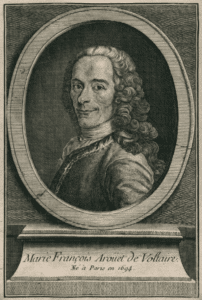
Following the death of the Marquise and a brief visit to Paris, Voltaire moved to Prussia at the invitation of Frederick, by then King of Prussia, but not yet Frederick the Great. There, while living under Frederick’s protection and on his payroll, Voltaire produced Micromegas, an early work of science fiction in which extraterrestrials visit Earth and observe the foibles of the human race. In answer to a human’s question comparing the natural and the supernatural, Voltaire’s alien expounds, “…I say again that nature is like nature. Why bother looking for comparisons?”. The alien observes human reason is limited, the universe limitless.
At the same time, as he had in the French Court years earlier, Voltaire made enemies as easily as he amused his friends and patrons. By mid-1752, Voltaire was no longer welcome at Frederick’s court, having, as he did so often throughout his long life, made powerful enemies among the nobility and influential religious leaders. Frederick banished him from the court, though the two remained correspondents.
As he slowly journeyed back towards France and Paris in 1754, he learned that he was once again banned from the French capital, where his enemies accused him of spying for the Prussians. With enemies behind him and before him, he turned left, settling on an estate near Geneva. There he published another epic poem, La Purcelle ( The Maid of Orleans ). In his earlier Henriade , he had made a national hero out of the relatively unknown Henry IV. In La Purcelle , he lampooned a national heroine, Joan of Arc, and her legend for the religious aspects of her story. It was banned in most of France, as well as in Geneva, due to its frequent licentiousness and near pornographic imagery. Voltaire left Geneva and settled on an estate at Ferney, just inside France, where he lived for the rest of his life.
Let us Cultivate our Garden
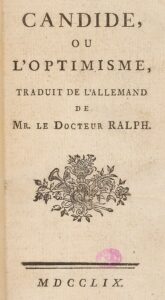
In 1759, Voltaire published Candide , arguably his best-known and certainly his most widely-read work today. Its hero, Candide, his mentor Dr. Pangloss, and a host of colorful characters endure calamities and misadventures in a fictional world. Voltaire used satire and parodied historical events, including the 1755 Lisbon earthquake which killed an estimated 40-50,000 people. Religion, the military establishments, war, philosophers, charlatans, and humanity itself are all targets for Voltaire’s prose, dispatched with humorous contempt.
Candide also contained a condemnation of slavery, one of many throughout Voltaire’s canon. When the naïve Candide encounters a slave in French Guiana, mutilated in an attempted escape, he gasps at “…what price we eat sugar in Europe”. The enslaved victim gives the opinion that if all humanity shared common ancestry, as described in the Book of Genesis, then all were related, and “…no one could treat their relatives so horribly”.
Candide discovers a utopian society dubbed El Dorado, where he encounters a humanity freed of religious dogma, a paradise governed by human reason. When he asked if the citizens therein prayed to a God, he received the reply, “We do not pray to him at all. We have nothing to ask of him.” Yet to Voltaire, the seemingly perfect world of El Dorado could not exist. If all were truly equal in all things, as its citizens claimed, then any discontent in one must reflect in another. The best of all possible worlds for one is not necessarily the best for all.
Candide derides the then popular philosophy of optimism, with its frequently repeated observation that no matter how bad a situation appears, it is for the best, another way of repeating that it is God’s will. When a man encountered during Candide’s travels asks of optimism, “What is that?”, Candide replies, “It is the obstinacy of maintaining that everything is best when it is worst”. Having observed that life is full of thorns, Candide arrived at the belief that all must “cultivate our garden” in the manner most suitable to their own existence.
The book was immediately banned or censored throughout France as being blasphemous, seditious, and scandalous. It eventually came to be regarded as one of the greatest works of French literature ever written.
He followed Candide with his Dictionnaire Philosophiques (Dictionary of Philosophy), a work he had begun while living in Prussia and continued to amend and expand for the rest of his life. The book originally consisted of 73 articles, in alphabetical order, later expanded to 120 entries. Each is a subject of philosophical discussion, often in the form of a dialogue between characters. They range from Adultery to Why?, and point out the inconsistencies and outright hypocrisies of many of the positions of the government, religions, and philosophers over the laws of nature and the natural rights of humanity. It too was banned across France.
I Die Adoring God

In early 1778, the aged Voltaire journeyed to Paris to attend to the first staging of his play Irene. Stricken gravely ill during the mid-winter journey, Voltaire wrote what should have been his epitaph. “I die adoring God, loving my friends, not hating my enemies, and detesting superstition”. Then he recovered, attended Irene’s performance in March, and enjoyed the acclaim and applause it generated. By the end of April he was again ill. He died at the end of May, 1778, probably of uremia. After his death, his political and religious enemies claimed that, on his deathbed, he had accepted baptism into the Roman Catholic Church and confessed his sins to a priest. There is no evidence that he did so. Although a priest did attend him and urged him to confess, Voltaire responded by waving him away, uttering, “ Laissez-moi mourir en paix ” (Let me die in peace).
There is also no evidence that while on his deathbed he responded to the urging of a priest to renounce Satan and replied, “This is no time to be making enemies”. That is but one of numerous quotes misattributed to Voltaire, including one which went viral on social media in 2022, “If you want to know who controls you, look at who you are not allowed to criticize”. Such misattributions play on the continued resonance of the name Voltaire.
The Catholic Church denied his remains’ burial in consecrated ground in Paris, another indication of his refusal to accept conversion. His mistress Marie Louise was the sister of the Abbe of Scellieres in Champagne, and through his influence Voltaire was buried at the Abbey there. In 1791, as revolutionary fervor rocked France, his remains were returned to Paris and enshrined in the Pantheon after a procession attended by over 1 million people.
In 1968, the first volume of the Complete Works of Voltaire , compiled and translated by the Voltaire Institute and Museum in Geneva, was published. In 1976, the project to compile all of Voltaire’s prodigious amount of work moved to Oxford’s Voltaire Foundation. In April 2022, the 205 th and final volume of the series was published. According to the Voltaire Foundation, his life’s writings extended to over fifteen million words, covering nearly all aspects of human existence as was known during his lifetime. Based on references in known documents, up to 25,000 letters written by Voltaire have yet to be found. Thus, there may well yet be some unknown pearl of wit recorded by Voltaire that is pithy, irreverent, sarcastic, and still bitingly relevant.
Related Biographies

By Arnaldo Teodorani Three centuries after the fall of the Roman Empire, most of Western Europe was divided into small Kingdoms frequently at war with each other. They were threatened by the Umayyad Caliphate from the…
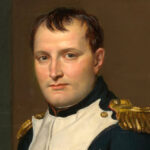
He is remembered as a military genius, a tactician without peer. At the age of 35, having just crowned himself the First Emperor of France, he set about conquering all of Europe. His name was Napoleon…

He was a king whose reign outshone even the sun. Louis XIV of France was one of history’s major monarchs, ruling with absolute power for nearly three-quarters of a century. In Europe, the length of his…

Sometimes history throws up a figure so dynamic, it seems like they’ve witnessed every important event of their era. In the case of the Marquis de Lafayette, he didn’t just witness these events. He often caused…
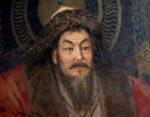
Genghis Khan - a name that is synonymous with barbaric cruelty and conquest. 800 years ago he created the greatest army the world has ever known, wielding it with tactical brilliance to lay claim to the…

Fred Rogers was a legitimate American national treasure. Over 31 seasons he proved to be the reliable, compassionate and all-wise friendly neighbor who guided millions of youngsters through their childhood. Fred single-handedly introduced children’s educational television,…
Leave A Reply Cancel Reply
Save my name, email, and website in this browser for the next time I comment.
Please enter an answer in digits: 10 + 17 =
Type above and press Enter to search. Press Esc to cancel.
Author of the satirical novella 'Candide,' Voltaire is widely considered one of France's greatest Enlightenment writers.
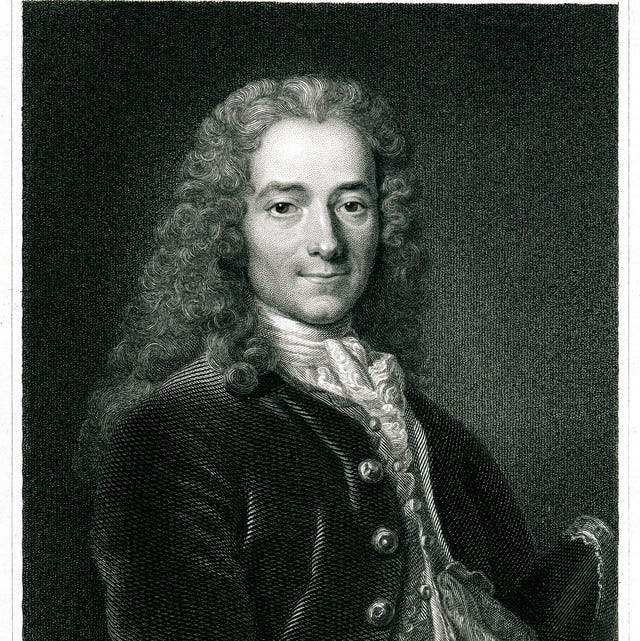
Who Was Voltaire?
Voltaire established himself as one of the leading writers of the Enlightenment. His famed works include the tragic play Zaïre , the historical study The Age of Louis XIV and the satirical novella Candide . Often at odds with French authorities over his politically and religiously charged works, he was twice imprisoned and spent many years in exile. He died shortly after returning to Paris in 1778.
Quick Facts
FULL NAME: François-Marie Arouet BORN: November 21, 1694 DIED: May 30, 1778 BIRTHPLACE: Paris, France ASTROLOGICAL SIGN: Scorpio
Voltaire was born François-Marie Arouet to a prosperous family on November 21, 1694, in Paris. He was the youngest of five children born to François Arouet and Marie Marguerite d'Aumart. When Voltaire was just seven years old, his mother passed away. Following her death, he grew closer to his free-thinking godfather.
In 1704, Voltaire was enrolled at the Collége Louis-le-Grand, a Jesuit secondary school in Paris, where he received a classical education and began showing promise as a writer.
Beliefs and Philosophy
Embracing Enlightenment philosophers such as Isaac Newton , John Locke and Francis Bacon , Voltaire found inspiration in their ideals of a free and liberal society, along with freedom of religion and free commerce.
Voltaire, in keeping with other Enlightenment thinkers of the era, was a deist — not by faith, according to him, but rather by reason. He looked favorably on religious tolerance, even though he could be severely critical towards Christianity, Judaism and Islam.
As a vegetarian and an advocate of animal rights, however, Voltaire praised Hinduism, stating Hindus were "[a] peaceful and innocent people, equally incapable of hurting others or of defending themselves."
Major Works
Voltaire wrote poetry and plays, as well as historical and philosophical works. His most well-known poetry includes The Henriade (1723) and The Maid of Orleans , which he started writing in 1730 but never fully completed.
Among the earliest of Voltaire's best-known plays is his adaptation of Sophocles' tragedy Oedipus , which was first performed in 1718. Voltaire followed with a string of dramatic tragedies, including Mariamne (1724). His Zaïre (1732), written in verse, was something of a departure from previous works: Until that point, Voltaire's tragedies had centered on a fatal flaw in the protagonist's character; however, the tragedy in Zaïre was the result of circumstance. Following Zaïre, Voltaire continued to write tragic plays, including Mahomet (1736) and Nanine (1749).
Voltaire's body of writing also includes the notable historical works The Age of Louis XIV (1751) and Essay on the Customs and the Spirit of the Nations (1756). In the latter, Voltaire took a unique approach to tracing the progression of world civilization by focusing on social history and the arts.
Voltaire's popular philosophic works took the form of the short stories Micromégas (1752) and Plato's Dream (1756), as well as the famed satirical novella Candide (1759), which is considered Voltaire's greatest work. Candide is filled with philosophical and religious parody, and in the end the characters reject optimism. There is great debate on whether Voltaire was making an actual statement about embracing a pessimistic philosophy or if he was trying to encourage people to be actively involved to improve society.
In 1764, he published another of his acclaimed philosophical works, Dictionnaire philosophique , an encyclopedic dictionary that embraced the concepts of Enlightenment and rejected the ideas of the Roman Catholic Church.
Arrests and Exiles
In 1716, Voltaire was exiled to Tulle for mocking the duc d'Orleans. In 1717, he returned to Paris, only to be arrested and exiled to the Bastille for a year on charges of writing libelous poetry. Voltaire was sent to the Bastille again in 1726, for arguing with the Chevalier de Rohan. This time he was only detained briefly before being exiled to England, where he remained for nearly three years.
The publication of Voltaire's Letters on the English (1733) angered the French church and government, forcing the writer to flee to safer pastures. He spent the next 15 years with his mistress, Émilie du Châtelet, at her husband's home in Cirey-sur-Blaise.
Voltaire moved to Prussia in 1750 as a member of Frederick the Great's court, and spent later years in Geneva and Ferney. By 1778, he was recognized as an icon of the Enlightenment's progressive ideals, and he was given a hero's welcome upon his return to Paris. He died there shortly afterward, on May 30, 1778.
In 1952, researcher and writer Theodore Besterman established a museum devoted to Voltaire in Geneva. He later set about writing a biography of his favorite subject, and following his death in 1976, the Voltaire Foundation was vested permanently at the University of Oxford.
The foundation continued to work toward making the Enlightenment writer's prolific output available to the public. It was later announced that The Oxford Complete Works of Voltaire , the first exhaustive annotated edition of Voltaire’s novels, plays and letters, would expand to 220 volumes by 2020.
In November 2017, during an event to celebrate what would have been Voltaire's 323rd birthday, foundation director Nicholas Cronk explained how the famed writer used inaccuracies to generate attention. Among his fabrications, Voltaire offered up differing dates for his birthday and lied about the identity of his biological father.
- A witty saying proves nothing.
- All murderers are punished unless they kill in large numbers and to the sound of trumpets.
Fact Check: We strive for accuracy and fairness. If you see something that doesn’t look right, contact us !
The Biography.com staff is a team of people-obsessed and news-hungry editors with decades of collective experience. We have worked as daily newspaper reporters, major national magazine editors, and as editors-in-chief of regional media publications. Among our ranks are book authors and award-winning journalists. Our staff also works with freelance writers, researchers, and other contributors to produce the smart, compelling profiles and articles you see on our site. To meet the team, visit our About Us page: https://www.biography.com/about/a43602329/about-us

Philosophers

Noam Chomsky
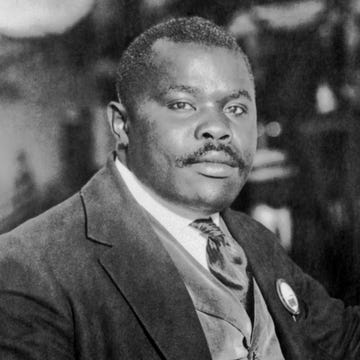
Marcus Garvey
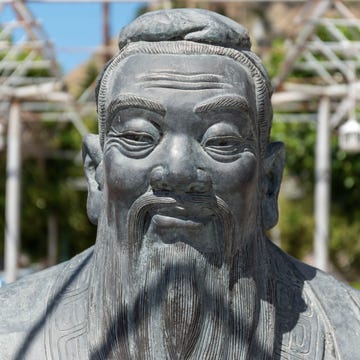
Francis Bacon
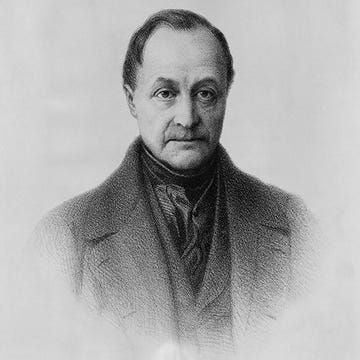
Auguste Comte
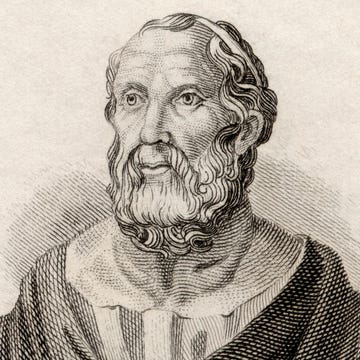
Charles-Louis de Secondat

Saint Thomas Aquinas
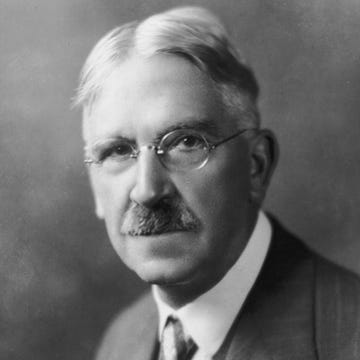
William James

John Stuart Mill
Philosophy Break Your home for learning about philosophy
Introductory philosophy courses distilling the subject's greatest wisdom.
Reading Lists
Curated reading lists on philosophy's best and most important works.
Latest Breaks
Bite-size philosophy articles designed to stimulate your brain.


Voltaire The Best 5 Books to Read
V oltaire (1694 - 1778) is the pen name of François-Marie Arouet, a French Enlightenment writer, historian, and philosopher. Famous for writing with supreme wit and intelligence, Voltaire was a strong advocate of civil liberties, free speech, and the separation of church and state, and wrote sustained critiques on the philosophy and religion of his contemporaries.
Voltaire was a true celebrity of his day — his satires and outspoken polemics brought him huge international recognition — and, along with John Locke and Immanuel Kant , he’s gone down in history as a key voice for Enlightenment values.
Writing thousands of works and pamphlets over his lifetime — from poems and plays to histories and novellas — Voltaire’s interests spanned virtually every literary genre.
This reading list consists of the best books on and by Voltaire. After reading it, you’ll understand exactly why this brilliant French thinker was so popular in his own lifetime, and retains such influence in ours. Let’s dive in!
1. Voltaire: A Very Short Introduction, by Nicholas Cronk
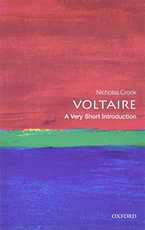
Voltaire: A Very Short Introduction
BY NICHOLAS CRONK
Published in 2017, Nicholas Cronk’s Voltaire: A Very Short Introduction is a fantastic place to start for anyone with a budding interest in Voltaire’s life and work.
Considering the sheer breadth and depth of Voltaire’s writings, Cronk does an admirable job in providing an illuminating overview of his most important arguments and ideas.
Cronk also provides helpful background about the politics and concerns of the Enlightenment period to contextualize Voltaire’s remarkable fame and career, and makes clear why his influence continues to be so enduring. Coming in at an accessible 144 pages, Voltaire: A Very Short Introduction is a very nice entry point to Voltaire.
2. Voltaire Almighty, by Roger Pearson

Voltaire Almighty
BY ROGER PEARSON
If you’re seeking to dive a little deeper with your Voltaire scholarship, look no further than Roger Pearson’s Voltaire Almighty , first published in 2005.
This biography brings Voltaire vividly to life, taking us on an entertaining journey through the great thinker’s intellectual and personal adventures — complete with love affairs, banishments, jail sentences, and international fame.
Pearson writes brilliantly to convey exactly why Voltaire personified the French Enlightenment throughout his lifetime, and became emblematic of it following his death. With its 480 pages packed full of insight, this book is highly recommended for those seeking a deeper understanding of Voltaire’s thought.
In one concise email each Sunday, I break down a famous idea from philosophy. You get the distillation straight to your inbox:
💭 One short philosophical email each Sunday. Unsubscribe any time.
3. Candide, by Voltaire
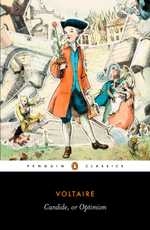
Candide, or Optimism
BY VOLTAIRE
Turning from introductions and biographies to primary texts, where better to start than with the novella that cemented Voltaire’s name into world history?
Though not his most read work during his own lifetime, Voltaire’s 1759 Candide has become the text by which most people know the great French thinker today — and for good reason.
Candide is one of the sharpest and most entertaining satires ever written, skewering a number of popular philosophical ideas of Voltaire’s time, including Leibniz’s suggestion that we live in ‘the best of all possible worlds’. Though Candide’s travels bring him to the heart of suffering and despair across the globe, he remains absurdly optimistic in the face of them.
Voltaire thus brilliantly exposes “the mania for insisting that all is well when all is by no means well,” and his writing is as fresh and comedic today as it was almost three centuries ago — making Candide simply essential reading for anyone interested in Voltaire.
4. Treatise on Toleration, by Voltaire
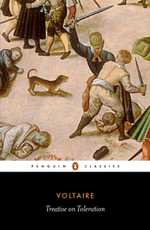
Treatise on Toleration
In 1762, a merchant from Toulouse named Jean Calas was publicly executed after being accused of killing his son. The execution was particularly brutal — Calas was pulled apart by four horses, and it reportedly took a long time for him to die. However, after his death, it soon became clear that Calas was not guilty at all, and that he was persecuted simply for being Protestant in a Catholic-dominated town.
Voltaire took great interest in what became known as the Calas affair , and began a campaign to clear Calas’s name. In so doing, he wrote dozens of pamphlets and texts that took the Calas affair international.
Voltaire’s 1763 Treatise on Toleration is his story of this case — as well as a powerful polemic against fanaticism, a strong defense of religious freedom, and a rallying cry for tolerance.
This important work encapsulates all that is brilliant about Voltaire: his bravery in standing up to established authorities, his attunement to Enlightenment values, and his brilliantly sharp, politically-engaged, persuasive writing.
5. A Pocket Philosophical Dictionary, by Voltaire
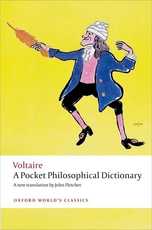
A Pocket Philosophical Dictionary
Voltaire’s controversial 1764 A Pocket Philosophical Dictionary consists of a series of short, witty, incisive essays arranged in alphabetical order on subjects ranging from atheism to tyranny.
Concise by design — the ‘pocket’ medium was a response to the lengthy, verbose encyclopedias being produced at the time — this brilliant work includes Voltaire’s famed critiques of religion, dogma, superstition, fanaticism, and another rallying cry for toleration.
Dripping in sarcasm throughout, and remaining startlingly fresh and modern with its conversational tone, the entries in A Pocket Philosophical Dictionary can be read in any order, making this a fun, thoughtful read for anyone interested in Voltaire and the ideas of the Enlightenment.
Further reading
Are there any other books you think should be on this list? Let us know via email or drop us a message on Twitter or Instagram .
In the meantime, why not explore more of our reading lists on the best philosophy books :

View All Reading Lists
Essential Philosophy Books by Subject
Get one mind-opening philosophical idea distilled to your inbox every Sunday (free):
About the author.

Jack Maden Founder Philosophy Break
Having received great value from studying philosophy for 15+ years (picking up a master’s degree along the way), I founded Philosophy Break in 2018 as an online social enterprise dedicated to making the subject’s wisdom accessible to all. Learn more about me and the project here.
If you enjoy learning about humanity’s greatest thinkers, you might like my free Sunday email. I break down one mind-opening idea from philosophy, and invite you to share your view.
Subscribe for free here , and join 16,000+ philosophers enjoying a nugget of profundity each week (free forever, no spam, unsubscribe any time).

Get one mind-opening philosophical idea distilled to your inbox every Sunday (free)

From the Buddha to Nietzsche: join 16,000+ subscribers enjoying a nugget of profundity from the great philosophers every Sunday:
★★★★★ (100+ reviews for Philosophy Break). Unsubscribe any time.
Each philosophy break takes only a few minutes to read, and is crafted to expand your mind and spark your curiosity.
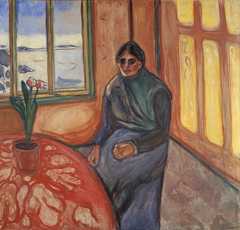
James Baldwin: Suffering Can Become a Force for Good
4 -MIN BREAK
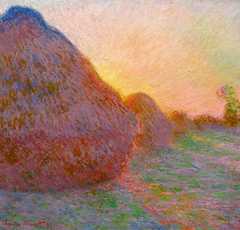
The Stoics on What to Do When the World Feels Broken
7 -MIN BREAK
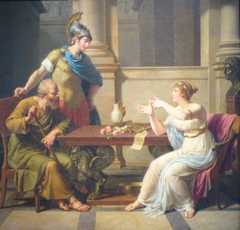
John Stuart Mill and Daniel Dennett on How to Critique ‘the Other Side’
5 -MIN BREAK
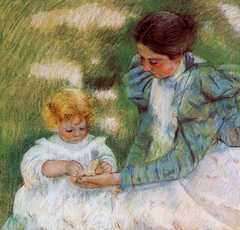
Laurie Ann Paul on How to Approach Transformative Decisions
9 -MIN BREAK
View All Breaks
PHILOSOPHY 101
- What is Philosophy?
- Why is Philosophy Important?
- Philosophy’s Best Books
- About Philosophy Break
- Support the Project
- Instagram / Threads / Facebook
- TikTok / Twitter
Philosophy Break is an online social enterprise dedicated to making the wisdom of philosophy instantly accessible (and useful!) for people striving to live happy, meaningful, and fulfilling lives. Learn more about us here . To offset a fraction of what it costs to maintain Philosophy Break, we participate in the Amazon Associates Program. This means if you purchase something on Amazon from a link on here, we may earn a small percentage of the sale, at no extra cost to you. This helps support Philosophy Break, and is very much appreciated.
Access our generic Amazon Affiliate link here
Privacy Policy | Cookie Policy
© Philosophy Break Ltd, 2024


IMAGES
VIDEO